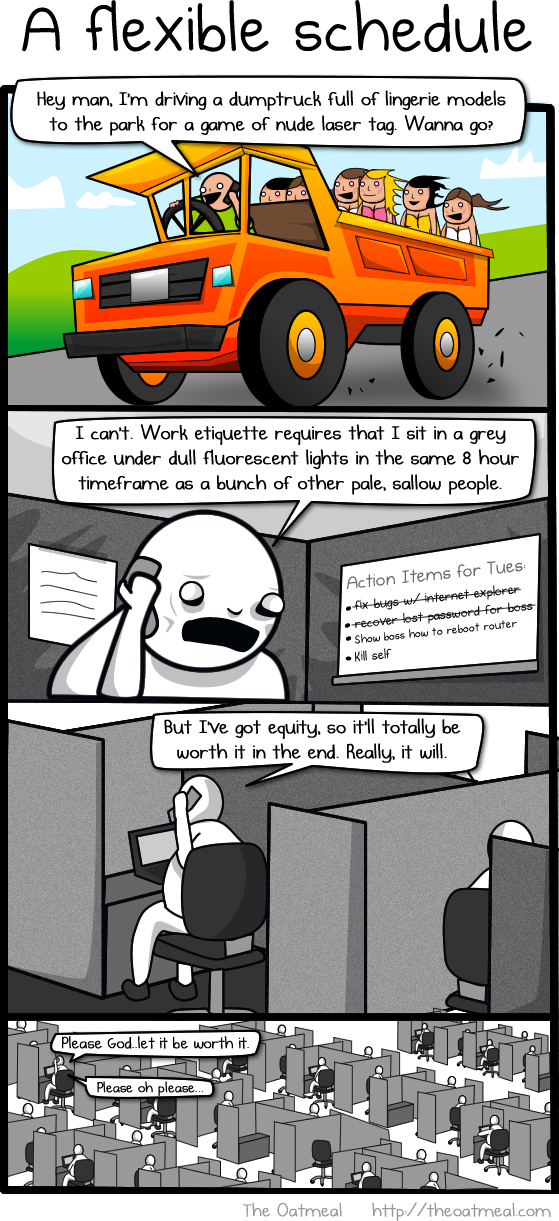🏠 WFH Culture
With the COVID-19 crisis, remote work is now the default. Using my experience of exclusively working remotely, I share my thoughts on how traditional company culture around working from home should change even after the crisis is over.
Your life no longer revolves around the office
You've likely experienced the 9-5 lifestyle of office work:
- 🌅 7am: Wake up and get ready
- 🚘 8am: Commute to the office
- 💻 9am: Work in the morning
- 🍽 12pm: Lunch break
- 💻 1pm: Work in the afternoon
- 🚗 5pm: Commute from the office
It's not just an 8 hour work day. You spend time getting ready and commuting to and from the office. Additionally, you are not actually productive during all 8 of those hours.
Take advantage of being able to spend your time on essential work. This means that your new schedule might look something like this:
- 🌅 7am: Wake up and get ready
- 👟 8am: Take a walk or meditate
- 💻 9am: Work in the morning
- 😴 11pm: Early break
- 🧺 12pm: Run some chores
- 🍽 1pm: Lunch break
- 💻 2pm: Work in the afternoon
A flexible schedule means more time spent on your well being so that your productivity during work hours is optimized.
Remote work is a different mentality
Remote work changes the way that you think about work. In a traditional company, working is considered being at the office during work hours (with some work being completed). When you work remotely, it is all about the output of your work.
Traditional companies are afraid of trusting their people to use their work hours wisely, but in reality they are more inclined to do so in a remote environment. Without being able to show physical presence at the office you are forced to show the results of your work hours.
A company does have to be setup for remote work though, and this is why we've seen some micromanagement focused policies created due to lack of information.
Let's see what GitLab (an all-remote company) suggests:
- Hiring and working from all over the world instead of from a central location.
- Flexible working hours over set working hours.
- Writing down and recording knowledge over verbal explanations.
- Written down processes over on-the-job training.
- Public sharing of information over need-to-know access.
- Opening up every document for editing by anyone over top-down control of documents.
- Asynchronous communication over synchronous communication.
- The results of work over the hours put in.
- Formal communication channels over informal communication channels.
This "remote manifesto" can be found in GitLab's Remote Playbook
Changes I made to work remotely
It's not just on the companies. It takes time to adjust to this change to ensure you are just as productive if not moreso at home.
I initially worked in an office for 4 years before transitioning to a year of remote work. From that experience, I learned a few lessons:
- 🖥 Spend time and money on proper equipment (write this off on taxes or get it completely reimbursed by the company if possible).
- 🕐 Learn how to manage your own time. Write down a reasonable list of tasks in the morning that you want to accomplish.
- 🧼 Make time for self care. Hygiene is just as important when you're not seeing people in person. Not only is it healthy, but it makes you feel energized and motivated.
- 🎥 Turn on your webcam during conference calls. Seeing people's reactions and body language makes communication easier and more social.
- 👟 Move around. Be it going to the gym or taking a walk in between long periods of sitting at your desk.
I am fully remote right now working at Nomad due to COVID-19, but we were already extremely flexible with remote working policies. This has allowed us to adapt quickly to the situation.
Share your experience
I'd love to hear your take on this. Do you enjoy working from home or prefer to commute to the office? Should all companies be flexible enough to allow remote work? How do you think COVID-19 will change work culture?
